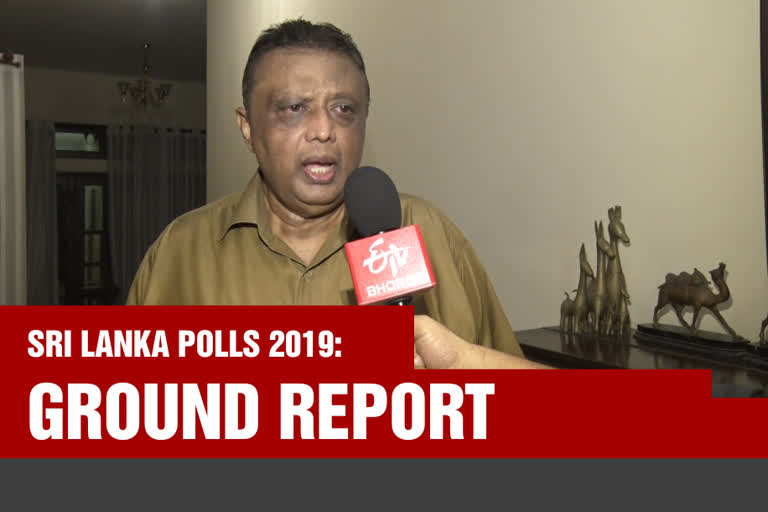Colombo: As the final countdown to the Sri Lanka Presidential Polls begins, all eyes are firmly set on the Muslim Community in the island nation, as their votes could play a major role in deciding the fate of the candidates.
On the eve of the polls, ETV Bharat spoke exclusively to Hilmy Ahmed, Vice President of the Muslim Council of Sri Lanka to get an insight into the Muslim community's thought process as they get ready to exercise their franchise.
Here is the full transcript of the interview:
What is worrying the Muslim population of Sri Lanka post the April 21 attacks?
Hilmy Ahmed: Of course, the Muslims are very scared of the extremist groups who might target them. But Muslims are also very concerned about what happened on April 21, because it was totally unexpected. No Muslim knew about this. It was a small group. We are very worried that there may be one or two other lone wolves.
Is the Muslim Community also worried about the radicalisation of the youth post the incident?
Hilmy Ahmed: That is the worry which we had immediately after the bomb attacks, but our religious leadership has intervened. We have also mobilised all the mosques across the country to talk to their own congregations and to address any kind of radicalisation. So, more or less every mosque is monitoring the environment around. So there are very few chances of anybody trying to go in and radicalise.
Is the community also worried about the possibility of a radical regime coming to power?
Hilmy Ahmed: It is a very tricky situation for the Muslims. While most would agree that we need a strong man to put the country back on track, it is almost impossible for the Muslims to think about voting for Mr Gotabaya Rajapaksa. Majority of the Muslims may not vote for him - not because they don't want him, but because of all the racism, the Buddhist extremist elements who are flocking around him. They fear that these extremist elements would have a much bigger say in governance than anybody else. I doubt very much that Muslims will be keen to vote Mr Gotabaya Rajapaksa.
Have the elections deepened the divide between the two communities?
Hilmy Ahmed: You cannot say there was no divide. Since the end of the Eelam War in 2009, more or less these extremists turned their guns on the other minority - the Muslims. They have been having a hate campaign which has been progressing to unbearable limits. With 21/4, which affected mostly the Catholics or Christians, there was nothing immediately afterwards because the Cardinal intervened and made it very clear that this was not a Muslim issue. It is a question of terrorism and has to be addressed as such. But three weeks later, a bunch of Buddhist extremists started rioting in two districts causing billions in losses to the Muslims. So that has been going on. But what is of concern to us is that the moment Gotabaya Rajapaksa was announced as the Presidential candidate, all these extremists have gone into hibernation. There is absolutely no hate against the Muslims now, because they are going to be the deciding factor in the election. If 20 per cent of Muslims vote for Rajapaksa, he's sure to win.
Read: India need not worry over our closeness with China: Sri Lanka
Has the Muslim Community tried to reach out to the Buddhist Majority as well as the Christian minority after the incident?
Hilmy Ahmed: Of course, we have a continuous process of consultations. But almost the absolute majority of Buddhists are not racists. It is a small bunch of a few Buddhist priests as well as extremists who are causing this. In fact, the Muslim Council had five rounds of talks with the biggest extremist monk - Gnanasara Thero. We came to a fairly good understanding. But after that, he was imprisoned on contempt of court charges. Since then, our consultations broke down.
Have the people who left their homes post the attacks been rehabilitated?
Hilmy Ahmed: It was not a major exodus of people who left. But of course, people in villages could not go to nearby towns to conduct their business and the economy was affected. So, both Muslim Council and many of the Muslim Civil Society Groups have gone in there to support livelihood programs which could be undertaken within the villages. It has been successfully implemented now.
What kind of percentage of Muslims do you see voting for Gotabaya and what percentage for Premadasa?
Hilmy Ahmed: I cannot give you exact figures. But I would say the absolute majority of Muslims will vote against Gotabaya, as I said, not because of Gotabaya Rajapaksa, but because of all the extremists surrounding him.
Do you see a change of perception in day-to-day life in Sri Lanka?
Hilmy Ahmed: Immediately after the bombing, every Muslim was seen as a terrorist. But as I said, since the announcement of Gotabaya Rajapaksa as the Presidential candidate, there is zero racism from that camp. So, that worries us even more, because should they win, would they come back with vengeance? Because they are all chained now, not doing anything. But either they win or lose - both might be dangerous for Muslims.
Read: 'Post-Easter attack, we're still waiting to get justice'



